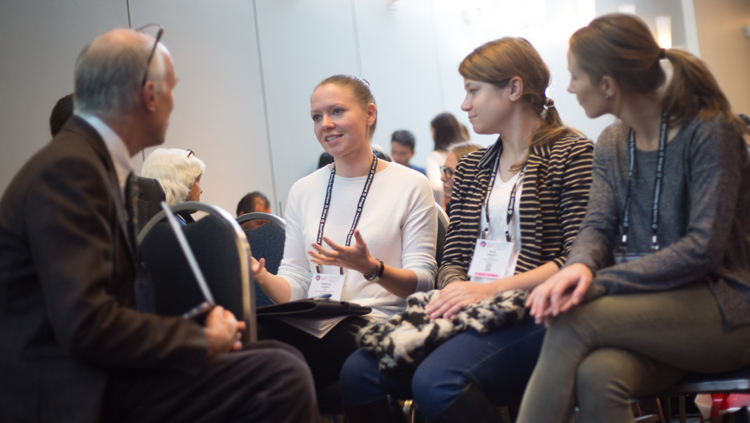Featured Panel Sessions

Basic-Translational-Clinical Roundtables
Pain Management and Opioids in the Time of COVID-19
Chair: Simon Haroutounian, PhD
Washington University School of Medicine
Speakers: Daniel Ciampi de Andrade, MD, PhD; Chung Jung Mun, PhD
Date & Time: Sunday, November 13, 10:30 a.m.–noon PST
Location: SDCC 11
Theme: Theme D – Sensory Systems
This Basic-Translational-Clinical Roundtable session will focus on pain management in the times of COVID-19. Emerging evidence suggest that COVID-19 is associated with new onset of pain and worsening of pre-existing pain in some patients. This session will discuss the epidemiology and mechanisms of new onset pain and neuropathy in the context of COVID-19, including persistent symptoms. We will discuss the trajectories of pain, emotional distress, and opioid misuse behaviors, considering socio-demographic factors and individual differences in pain catastrophizing and sleep.
Advancing Treatments to Drive Functional Restoration After Spinal Cord Injury: Developing a Pathway to Facilitate the Translational Pipeline
Chair: Michael G. Fehlings, MD, PhD
University of Toronto
Co-Chair: Matthew J. Rodreick
Unite 2 Fight Paralysis
Speakers: Cathy Craven, PhD; Joanna Stanicka, PhD
Date & Time: Monday, November 14, 10:30 a.m.–noon PST
Location: SDCC 11
Theme: Theme C – Neurodegenerative Disorders and Injury
Despite advances in treating spinal cord injury (SCI), many individuals have substantial residual impairment and approaches to restore function are needed. This roundtable will discuss the challenges and opportunities in translating restorative treatments for SCI into the clinic. Following brief presentations, a moderated roundtable discussion will address key issues. Representatives from key stakeholder groups are encouraged to attend the session and an interactive discussion will be facilitated.
COVID and Olfaction
Chair: John Ngai, PhD
National Institute of Neurological Disorders and Stroke
Speakers: Bradley J. Goldstein, MD, PhD; Eric H. Holbrook, MD; Marianna Zazhytska, PhD
Date & Time: Wednesday, November 16, 10:30 a.m.–noon PST
Location: SDCC 11
Theme: Theme D – Sensory Systems
SARS-CoV-2, the causal agent in COVID, causes significant acute and chronic changes to nervous system function. In this roundtable, panelists will focus on recent work defining how SARS-CoV-2 affects the human sense of smell. This panel will discuss likely mechanisms, possible treatments, and implications for our understanding of how COVID influences brain function more generally.
Dual Perspectives
Population or Single Cell Coding: What Is the Language of the Brain?
Moderator: Srdjan Ostojic, PhD
Ecole Normale Superieure
Panelists: Lisa M. Giocomo, PhD; Adam Kepecs, PhD; Kanaka Rajan, PhD
Date & Time: Monday, November 14, 2–3:30 p.m. PST
Location: SDCC 6B
Theme: Theme H – Cognition
Neural coding is currently envisioned either in terms of cell-classes based on functional, genetic or anatomical properties, or in terms of distributed, mixed-selective populations. Are these two views mutually exclusive, or can they be bridged to form a common framework? In this Dual Perspectives session, Dr. Giocomo will discuss the limits of the cell-class view in the navigational system, Dr. Kepecs will show how cell classes appear despite mixed-selectivity in the orbito-frontal cortex, and Dr. Rajan will combine the two views to describe computations across brain areas.
Should We Abandon Statistical Significance Testing in Neuroscience? Arguments for Replacing It With Estimation Methods vs Retaining and Improving It
Moderator: Christophe Bernard, PhD
INSERM, Aix-Marseille Université
Panelists: Bradley E. Alger, PhD; Robert Calin-Jageman, PhD
Date & Time: Wednesday, November 16, 2–3:30 p.m. PST
Location: SDCC 29
Theme: Theme I – Techniques
Within neuroscience and beyond there is fierce debate about statistical significance and hypothesis testing. Some want to replace significance testing with estimation; others contend this would be a grave error. This controversy involves profound issues about how we carry out and evaluate neuroscience research. In this session, we will offer both an argument for focusing on estimation (Calin-Jageman) and an opposing argument for improving significance testing (Alger).
Storytelling Session
Who Speaks for the Community? How Storytelling Unites Research and Society on the Quest to Improve the Lives of Individuals With Spinal Cord Injury
Chair: John C. Gensel, PhD
University of Kentucky
Host: Jennifer French
Panelists: Ian Burkhart; Lyn Jakeman, PhD; Barry Munro; Susan Schaeffer; Andrew N. Stewart, PhD
Date & Time: Sunday, November 13, 2–3:30 p.m. PST
Location: SDCC 29
Theme: Theme J – History, Education, and Society
Overcoming neuroscience challenges requires inspired dedication. This session will use storytelling to personalize the motivations of individuals dedicated to driving change. Personal stories will showcase the unique origins of a diverse group (research, advocacy, lived experience, government) united toward a common goal. The session itself is a story of how one field, spinal cord injury, is forging citizen-scientist relationships to impact the direction and translation of scientific research.




















